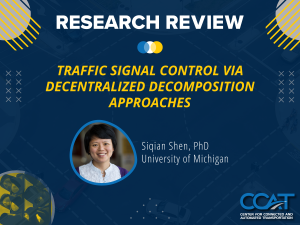Presented By: Center for Connected and Automated Transportation
Traffic Signal Control via Decentralized Decomposition Approaches
Siqian Shen, Ph.D.

Traffic congestion is a global pressing issue that can be mitigated via effective traffic signal control schemes. In this presentation, based on a cell transmission model, the team from the University of Michigan coordinated the control of traffic signals at multiple intersections to maximize vehicle throughput on corridors or road networks under uncertain traffic demand and vehicle turning. They formulated a two-stage, stochastic mixed-integer linear program using finite samples of the uncertain parameter, and combined Benders decomposition with the alternating direction method of multipliers to develop spatially-temporally distributed algorithms for optimizing the problem. They then tested instances of traffic signal control on corridors and grid networks, based on synthetic and real-world traffic data. The results show that
1. considering traffic uncertainty can significantly improve the signal control quality and
2. decentralized decomposition approaches can quickly find high-quality signal plans for multiple intersections in complex road networks, and fully utilize the computation and communication technologies in smart-transportation infrastructures.
---
About the speaker: Siqian Shen is an Associate Professor and Richard Wilson Faculty Scholar in the Department of Industrial and Operations Engineering at the University of Michigan. She also serves as the Associate Director at the Michigan Institute for Computational Discovery & Engineering (MICDE). She obtained a B.S. degree from Tsinghua University in 2007 and Ph.D. from the University of Florida in 2011. Her theoretical research interests are in integer programming, stochastic/robust optimization, and network optimization. Applications include optimization and risk analysis of energy, healthcare, cloud computing, and transportation systems. She is a recipient of the IIE Pritsker Doctoral Dissertation Award, IBM Smarter Planet Innovation Faculty Award, and Department of Energy (DoE) Early Career Award.
1. considering traffic uncertainty can significantly improve the signal control quality and
2. decentralized decomposition approaches can quickly find high-quality signal plans for multiple intersections in complex road networks, and fully utilize the computation and communication technologies in smart-transportation infrastructures.
---
About the speaker: Siqian Shen is an Associate Professor and Richard Wilson Faculty Scholar in the Department of Industrial and Operations Engineering at the University of Michigan. She also serves as the Associate Director at the Michigan Institute for Computational Discovery & Engineering (MICDE). She obtained a B.S. degree from Tsinghua University in 2007 and Ph.D. from the University of Florida in 2011. Her theoretical research interests are in integer programming, stochastic/robust optimization, and network optimization. Applications include optimization and risk analysis of energy, healthcare, cloud computing, and transportation systems. She is a recipient of the IIE Pritsker Doctoral Dissertation Award, IBM Smarter Planet Innovation Faculty Award, and Department of Energy (DoE) Early Career Award.